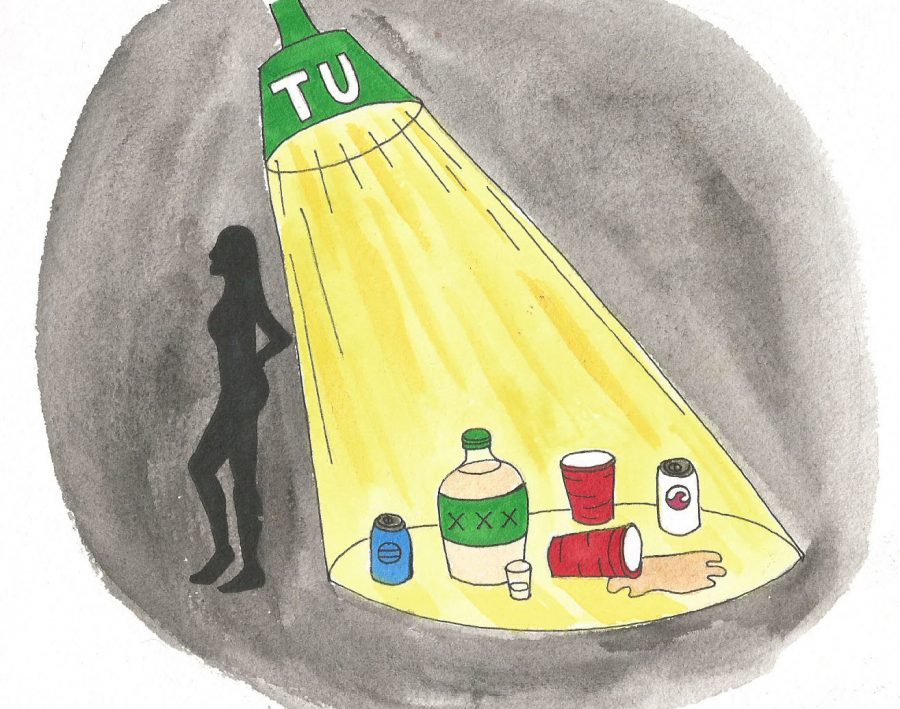Tulane policy still fails to address sexual violence
February 19, 2020
Lily runs the sexual violence support group for Kappa Alpha Theta Fraternity.
Following the 2017 Climate Assessment, Tulane launched the Wave of Change initiative in 2018. The initiative was an attempt to combat sexual violence through education and prevention programming, workshops and panels, promising “renewed attention” to the university’s efforts to keep students safe. Tulane’s initiative has been short-lived, however.
Rather than addressing the pervasive nature of sexual violence within the student body, the administration has redirected their efforts to targeting The Boot Bar and Grill as well as other drinking establishments, while providing ineffective counseling and resource services for survivors.
According to the climate survey, 74% of females and 84% of male respondents who experience a form of sexual violence reported being under the influence of alcohol at the time of their assault.
Despite the presence of alcohol and other substances in many reported assaults, the individual responsibility for the attack lies with the perpetrators. Suggesting otherwise blames the victim and lets the real culprits escape attention.
Punitive alcohol policies exacerbate the culture of silence surrounding sexual assault, especially those where the victim is intoxicated. Less than half of the women and under a quarter of men who reported experiencing sexual assault disclosed their experience to anyone, and most disclosures were to friends, relatives and partners, not the university. The university, in turn, has implemented a policy that deflects responsibility onto third parties.
Following Wave of Change, Tulane implemented increased measures against on-campus drinking and the frequenting of nearby establishments, particularly The Boot. Last year, they began adding the “Under 21” box around freshmen Splash Cards. The university argued that this addition would help prevent underage drinking and urged bars to check student identification.
Additionally, the Interfraternity Council and the Tulane administration prohibit first-year students from attending Greek life events during the first four weeks of school and established harsher punishments for violators of the alcohol policy during “high priority” periods throughout the year. The university claims that the Climate Survey did not drive their decision to implement new policies regarding alcohol. They believe, however, these rules will prevent sexual assaults by reducing excessive drinking.
Tulane’s adapted stance toward alcohol does not prevent underage students from drinking. Instead, it makes increased “pregaming” more attractive, creates fear about asking for medical help or police intervention, and drives students further off-campus. Underage students who drink before attending social functions on or off-campus are more likely to find themselves in binge-drinking environments without feeling like they have access to resources to help them in uncomfortable situations. This unease will only increase following the construction of the Tulane University Police Department substation next to The Boot.
While the university’s new stance on alcohol attempts to reduce possible sexual assaults, Tulane’s CAPS for Counseling Services fails to support survivors of assault. The inefficient appointment-making process and scarce availability leave students without adequate mental health services. Students have to call the office during business hours, neglecting fear or embarrassment survivors endure following an assault. Additionally, the typical wait time to schedule a CAPS meeting is two weeks.
Although CAPS offers an emergency same-day service, these too must be planned, and students are only entitled to 12 CAPS sessions per academic year unless recommended by a community provider. Consequently, this system neglects students who have suffered a recent trauma and may not be able to wait for assistance or those who do not deem their condition to be an emergency. Survivors who can set up a CAPS appointment receive a preliminary evaluation that many students report as being impersonal.
Tulane also offerers sexual assault evaluations at the Health Center for Student Care. But this too requires calling in advance. The university’s Title IX office provides formal reporting, and Case Management and Victim Support Services offer a 24-hour call line. The majority of Tulane’s survivors do not report their assault or seek out assistance from the university, however, demonstrating a failure of these systems.
Tulane’s focus on alcohol consumption and its involvement in sexual assaults deflects responsibility off of perpetrators. It is not alcohol that commits an attack. It is an individual who chooses to commit sexual assault. While alcohol increases an individual’s potential vulnerability, by creating fear around drinking openly, students over-consume alcohol in private. They are thus at a higher risk of alcohol-related illness or injury.
Placing blame upon drinking establishments neglects the true sources and necessary resources to address sexual assault on campus. Rather than blaming these institutions, the university should invest its time in adapting to the student culture to address sexual assault and dissuade potential perpetrators from committing assaults in the future. Furthermore, the university should redirect its efforts to mitigate the consequences of sexual assault on campus by providing adequate services for survivors. Impersonal methods of seeking resources and fear of the administration only harm survivors’ ability to heal following their assault.






















Leave a Comment